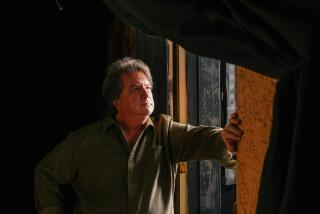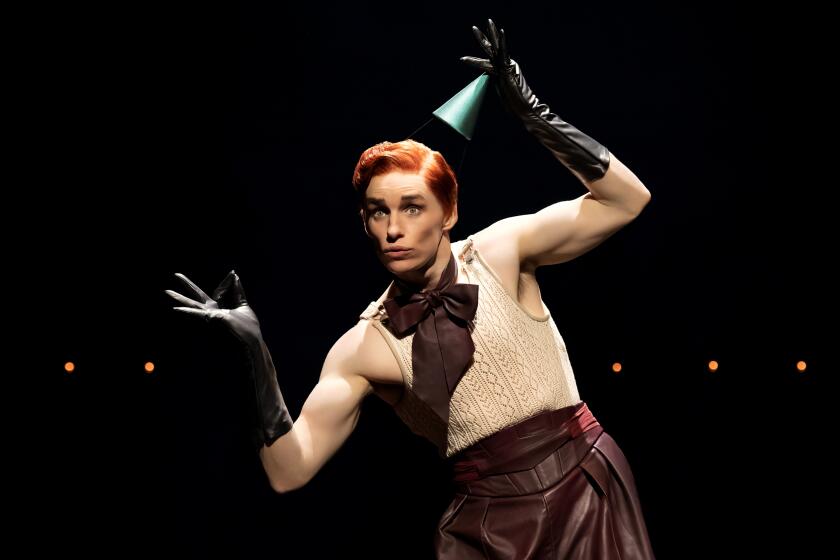Review: Annette Bening, Tracy Letts and a question of American morality in ‘All My Sons’
The carpentry of an Arthur Miller play, all that sawing, hammering and sanding of wood, can sometimes distract from the impressiveness of the house that has been theatrically constructed.
“All My Sons,” the 1947 Broadway play that established Miller as a major American dramatist, loads a tremendous amount of lumber onto the stage. Plank by plank, the dramatic edifice is assembled before our eyes. The labor can be cumbersome and rackety, as the Roundabout Theatre Company revival at the American Airlines Theatre reminds us. But the craftsmanship is at the service of a questioning moral vision of America that is as urgent today as it was in the early postwar years.
In the culminating clashes between Tracy Letts, who plays Joe Keller, a businessman with a bad conscience, and Benjamin Walker, who takes on the role of Chris, Joe’s idealistic war veteran son, the full strength of Miller’s playwriting is once again released. The production — directed by Jack O’Brien and starring Annette Bening as Joe’s wife, Kate — seems caught between a solid midcentury Broadway realism and a more theatrically fluid 21st century approach. But the core of the play, the situation of a disillusioned son’s inevitable confrontation with his hypocritical father that Miller would potently redeploy in “Death of a Salesman,” is explosively renewed.
The plot — and boy, is there a lot of plot crammed into this long day’s journey into the middle of the night — moves inexorably toward a reckoning of Joe’s shady past. A manufacturer who made a killing during the war, he shipped defective engine parts to the Air Force that resulted in the death of 21 men. His partner and former neighbor, Steve Deever (an unseen character), sits in jail while Joe, exonerated for insufficient evidence, has effectively sidestepped his guilt, preserving his wealth and reputation with minimal public shame.
Until now. Ann (Francesca Carpanini), Steve’s daughter who grew up next door until the business scandal upended her family’s life, has been invited back by Chris. She used to be romantically involved with Larry, Chris’ older brother who disappeared in the war and is presumed dead by everyone but Kate, who refuses to accept the obvious truth. Chris has decided to propose to his dead brother’s “girl,” setting in motion the series of events that will expose all that Joe has buried for the benefit of himself and what’s left of his family.
The play, which takes place in the backyard of Joe and Kate’s Midwestern home, enfolds a domestic drama in a larger American narrative about capitalist corruption. Douglas W. Schmidt’s suburban storybook scenic design highlights the communal flow integral to Miller’s point that the actions of a consequential man like Joe Keller don’t end at his property line.
‘KING LEAR’: How Glenda Jackson does battle with a brazenly busy production »
This Roundabout revival made headlines late last year when the Miller estate objected to the decision by Gregory Mosher, originally set to direct the production, to cast both Ann Deever and her brother, George, with African American actors. Rebecca Miller, the playwright’s filmmaker daughter, while generally supportive of diverse casting, expressed concerns that casting African American actors as the children of Joe’s imprisoned business partner could change the thematic dynamics, raising issues the play doesn’t address.
O’Brien’s production includes actors of color in important roles. Hampton Fluker plays George and Chinasa Ogbuagu plays Sue Bayliss, a neighbor with sharp opinions on the Keller family’s self-deceiving ways. The casting, neither colorblind nor thematic, is part of a theatrical tradition that has become more or less standard. If the company seems unsettled, the issue isn’t race but style. O’Brien’s ensemble mixes realism with contemporary classicism in a catch-as-catch-can way. It’s the acting equivalent of a mixed salad.
Letts, a Tony-winning actor (“Who’s Afraid of Virginia Woolf?”) and playwright (“August: Osage County”), successfully homes in on a Midwestern dad who enjoys playing the rube as the wheels inside his mind never stop spinning. He anchors the production and draws some of the finest work I’ve seen from Walker (“American Psycho,” “Bloody Bloody Andrew Jackson”), who brings out all the anguish, horror and sorrow in Chris’ rude awakening.
But there are moments beyond the crux of the play when the cast members seem stylistically disconnected. Bening, who is such an effortlessly real screen presence, traces the complicated subterranean complicity of Kate, a wife and mother who pretends to be too fragile to handle all the tragedy in her life yet maintains an iron grip on her household. The psychology is subtly worked out, but the performance occasionally calls attention to itself with technical flourishes and vocal shadings that made me more conscious of Bening than Kate.
The craftsmanship is at the service of a questioning moral vision of America that is as urgent today as it was in the early postwar years.
Carpanini’s Ann has just the right gentle sturdiness. Her scenes with Walker’s Chris — two characters relinquishing their benighted innocence for the sake of each other — are genuinely touching. But the neighbors running in and out of the Keller backyard come off as either sitcom flashes or interpretive stabs, compounding the artificiality that’s already present in the playwriting.
The melodrama, similar to Ibsen’s early prose plays, is built into the realism. But Miller’s dramaturgy isn’t as supple. The skeletons rattling in the closet, the old suicide note that conveniently answers nagging doubts and the densely packed time sequence can seem at odds with the play’s moral magnifying glass.
The last Broadway revival of “All My Sons,” Simon McBurney’s 2008 production starring John Lithgow and Dianne Wiest, dared to liberate the play from its naturalistic foundation. The result may have been structurally unsound, but more than a decade later I still cannot get Lithgow’s operatic howl of self-defense (“I’m in business, a man is in business …”) out of my head.
The Great Recession, fueled by financial fraud and governmental complicity, was upon us then. In 2019, a businessman with a record of self-serving bankruptcies leads the nation. One longs for the day when Miller’s drama will stop being so scathingly relevant. But what I won’t forget this time around is Walker’s aggrieved Chris pummeling Letts’ defiant Joe with questions that are on the minds right now of many citizens disgusted by powerful men who put selfish ends over collective means: “Don’t you have a country? Don’t you live in the world?”
HEIDI SCHRECK: ‘What the Constitution Means to Me’ supremely argues the case for women »
More to Read
The biggest entertainment stories
Get our big stories about Hollywood, film, television, music, arts, culture and more right in your inbox as soon as they publish.
You may occasionally receive promotional content from the Los Angeles Times.







